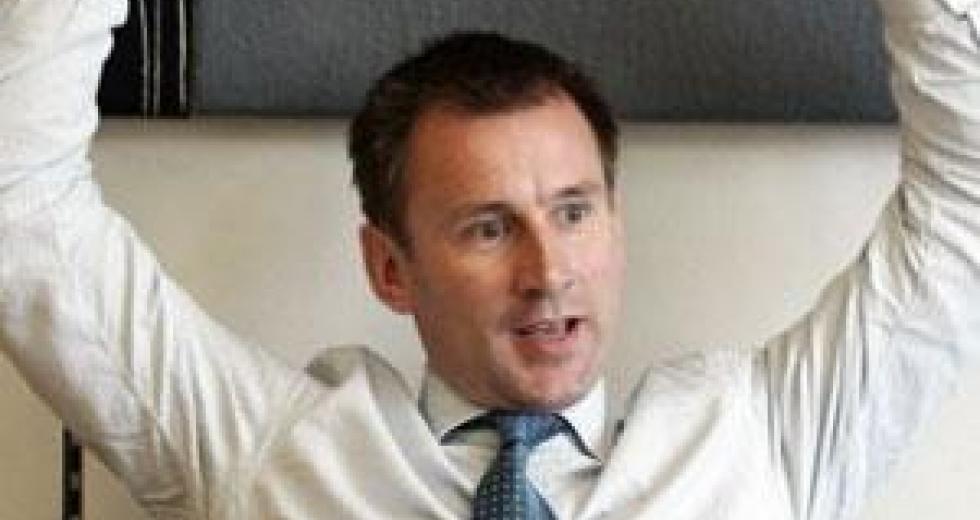
Our new government has a particular and historic responsibility: to rebuild confidence in our political system. After the scandals of recent years, people have lost faith in politics and politicians. It is our duty to restore their trust [...] We must be different from what has gone before us — careful with public money. Transparent about what we do and how we do it. Determined to act in the national interest, above improper influence. (Ministerial Code, May 2010, Foreword by David Cameron)
Recently, we learned of David Cameron’s refusal for an independent enquiry into the conduct of Jeremy Hunt, Secretary of State for Culture, Media & Sport in relation to his quasi-judicial role concerning Rupert Mudoch’s News Corporation’s proposed takeover of BSkyB for £8 Billion. Item 7.12 of the Ministerial Code states that:
Ministers should take care to ensure that they do not become associated with non-public organisations whose objectives may in any degree conflict with Government policy and thus give rise to a conflict of interest.
Responsibility for authorising investigations into any breach of the code falls to the Prime Minister following consultation with the Cabinet Secretary. Instead of the Prime Minister seeking an independent investigation of the Culture Secretary’s conduct, it was reported that Downing Street had hoped that the matter could be considered by Lord Leveson’s enquiry into the potential conflicts arising due to the close proximity of relationship between Government and the Media (Hackgate).
Item 7.13 of the Ministerial Code states that:
Ministers should not therefore normally accept invitations to act as patrons of, or otherwise offer support to, pressure groups, or organisations dependent in whole or in part on Government funding.
One such organisation might be the shadowy leadership training organisation Common Purpose, and I have previously postulated the hypothesis that CP has been operating as a stealth agent / Trojan horse of the United Nations. In order to transform theory into fact, we would need to identify instances where Common Purpose has been liaising with both the UK Government and the United Nations, particularly where there has been a drip feeding of UN ideology and beliefs into UK policy.
Examples of liaison between government ministers and Common Purpose might include William Hague’s Foreign & Commonwealth Office hosting a leadership development course by Common Purpose in Ankara, Turkey, in July 2010, whilst Cameron himself met Common Purpose course participants at the Infosys headquarters in Bangalore, India.
We can also reveal that Cameron is Honorary President of the United Nations Association (UK) and was previously a member of the All-Party Parliamentary United Nations Group. The purpose of this group is to support the work of the United Nations but what if this should conflict with the interests of the UK?
In Leveson Enquiry — Control of the Press and Media by David Bell’s Common Purpose, Brian Gerrish revealed that the investigating panel were examining the culture, practice and ethics of the UK press. He also suggested that the Media Standards Trust had been positioning itself to discredit the Press Complaints Commission and place itself as a candidate as the future press regulator. With Common Purpose Trustee David Bell occupying a position on the Leveson Panel whilst sitting alongside Common Purpose CEO Julia Middleton at the Media Standards Trust, there is a clear potential for bias / undue influence at this enquiry.
In Judge, Jury and Executioner, I revealed how each branch of the Scottish establishment (legislature, executive and judiciary) had been infiltrated by Common Purpose graduates and described the threat to personal liberties posed by potentially biased decision-making following the undermining of the separation of powers.
In Dark Actors Playing Games, Brian Gerrish revealed that Cameron’s Cabinet Office had been in a ‘secretive dialogue with Julia Middleton to achieve a culture change in the Top 200 Civil Servants using the Common Purpose model’.
The History & Remit Of The United Nations Educational, Scientific & Cultural Organisation (UNECSO)
The United Nations Educational, Scientific and Cultural Organisation was founded in London on 16th November 1945 and became operational in 1946.
The first Director-General of UNESCO was eugenicist Julian Huxley. In 1946, he wrote UNESCO: Its Purposes and Philosophy. Pages 43 to 60 of this document include the following subsections: The Creative Arts; Libraries, Museums and other Cultural Organisations; and The Mass Media.
Huxley expands the creative arts list further by including music, sculpture, opera, ballet and dance, drama, creative writing and documentary film making. He insisted
that what UNESCO must aim at is not the promotion of a single movement, but the orchestration of diversity. The only unity which can be contemplated is a world unity comprising regional and local diversities.
Huxley describes a future world in which the influence of UNESCO becomes all pervasive. He describes the social functions of art and suggests that
every country has now woken up to the need, in our complex modern world, of public relations, which is but a new name for propaganda.
In his conclusion on Page 60, he writes that UNESCO will:
[t]ake the techniques of persuasion and information and true propaganda that we have learnt to apply nationally in war, and deliberately bend them to the international tasks of peace, if necessary utilising them, as Lenin envisaged, to ‘overcome the resistance of millions’ to desirable change.
He then adds that
there are thus two tasks for the Mass Media division of Unesco, the one general, the other special. The special one is to enlist the press and the radio and the cinema to the fullest extent in the service of formal and adult education, of science and learning, of art and culture. The general one is to see that these agencies are used both to contribute to mutual comprehension between different nations. and cultures, and also to promote the growth of a common outlook shared by all nations and cultures.
It is quite clear from the language used that the arts, culture and media are to be utilised as vehicles for the transmission of propaganda to communicate UNESCO's drive to promote a common outlook shared by all nations and cultures, a global Common Purpose.
Interfaces Between UNESCO, UK Government And Civil Society
According to the terms of reference of the UK National Commission for UNESCO Culture Committee, it is to be the formal link between civil society, relevant departments in Her Majesty’s Government (primarily the Department for Culture, Media and Sport) and UNESCO on matters relating to all aspects of culture. The National Commission will also “include as input to UK policy-making on key UNESCO programmes and cultural issues”.
UNESCO also seeks to protect and preserve global heritage sites through an international treaty called the Convention concerning the Protection of the World Cultural and Natural Heritage 1972. The Department for Culture, Media and Sport acts as the State Party for the whole of the UK and is responsible for the UK’s general compliance with the Convention.
DCMS and Common Purpose
According to the Department for Culture, Media and Sport website, it is the department of the executive responsible for the following: the arts, broadcasting, fashion, film, the music industry, publishing, libraries, museums and galleries, press freedom and regulation, sport, tourism, the listing of historic buildings and the scheduling of ancient monuments.
In effect, it covers those responsibilities described by Huxley as being directed by UNESCO. Should representatives of Common Purpose be found both within the DCMS itself and also within those organisations falling within its sphere of control, there is clear potential for conflicts of interest. Such conflicts are currently trapped by Item 4.1.4 of the Civil Service Management Code, June 2011, which stipulates:
Civil servants should be, and be seen to be, honest and impartial in the exercise of their duties. They must not allow their judgement or integrity to be compromised in fact or by reasonable implication. In particular Civil servants must not misuse [...] information acquired in the course of their official duties to further their private interests or those of others. Conflicts of interest may arise from financial interests and more broadly from official dealings with, or decisions in respect of, individuals who share a civil servant’s private interests (for example freemasonry, membership of societies, clubs and other organisations).
Interrogation of the database of Common Purpose graduates published by the CPExposed website reveals that several senior members of DCMS are Common Purpose Graduates.
These included the Head of Local, Regional & International Division, the Head of Creative Industries Unit, the Head of Arts Education, the Head of Broadcasting Policy, the Head of the Historic Environment Policy Branch, and the DCMS Representative in the Government Office for London. Research also reveals that Allan Ferries, the former Head of the Creative Industries Unit (DCMS), is now Programme Manager of the Government Olympic Executive.
Ms Ruth Mackenzie is currently an expert advisor to DCMS and director of culture London Organising Committee of the Olympic and Paralympic Games. She was previously a board member of the New Millennium Experience Co. (1997–99) and member of the Executive Committee Common Purpose (1993–97).

Chris Bryant MP was formerly a Member of the Parliamentary Select Committee for Culture, Media and Sport (2001–2005) and London Manager for Common Purpose (1994–96).

Jude Kelly is the Artistic Director of Britain’s largest cultural institution, the South Bank Centre, and also Chair of Culture, Ceremonies and Education for the London Organising Committee for the Olympic Games (formerly London 2012). She has represented Britain within UNESCO on cultural matters. She jointly chaired, with Lord Puttnam (president of UNICEF UK), the Curricula Advisory Committee on Arts and Creativity. She chairs the Common Purpose International Trust and is a board member of the British Council.

Virginia Tandy is Director of Culture at Manchester City Council and a Common Purpose 20:20 graduate. She is a board member of the Cultural Leadership Programme.

According to the DCMS webpage on Arts Council Funding,
the Government is investing more than £2.2 billion in the arts over the next four years. Arts Council England is the national body for the arts in England, and is responsible for distributing public money from Government and the National Lottery. DCMS does not fund the arts directly, but through Arts Council England. In accordance with the arms length principle.
The regional arts councils (comprising 15 members) are responsible for grants over £25,000 for named, funded organisations.
Interrogation of the CPExposed database of Common Purpose graduates identified the following graduates occupying regional positions within the Arts Council:
- Executive Director, Arts Council East
- Executive Director, Arts Council North East
- Director of Finance, Arts Council North-West
- Senior Officer Cultural Diversity, Arts Council, London
- Chief Executive, Arts Council, Northern Ireland
Whilst the DCMS describes its policy of distribution of public money as being at arm’s length, in reality there appears to be considerable opportunity for such funds to be deliberately channelled towards favoured Common Purpose-led projects. That this could be happening unauthorised and in the absence of the competent Cabinet minister’s knowledge is not credible.

